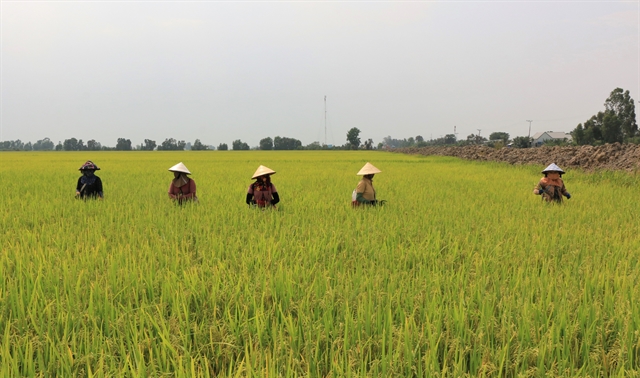 Society
Society


|
| Members of the Thạnh Lợi Agriculture Services Co-operative in Tháp Mười District tend their rice crop. – VNA/VNS Photo Nhựt An |
ĐỒNG THÁP – The Cửu Long (Mekong) Delta province of Đồng Tháp is seeking to develop the collective economy to improve incomes.
It has 214 co-operatives with a total of 55,000 members. Each has an average annual revenue of VNĐ3 billion (US$130,000) and profit of VNĐ320 million ($14,000).
Members earn an average income of VNĐ70 million ($3,000) a year.
The province also has more than 1,000 co-operative groups with more than 50,600 members.
Under current regulations, a co-operative needs to have at least seven members and a co-operative group, three.
The province has a number of policies to help develop the collective economy, including financial support for co-operatives to buy machinery and carry on production.
It has organised 250 training courses for 15,200 management workers at co-operatives, co-operative groups and farms.
The Mỹ Xương Mango Co-operative in Cao Lãnh District has successfully launched a model of selling mango trees to customers through its website, offering steady incomes to its members and clean fruits to consumers.
Under the model, customers buy a tree for a period of one year and its owner harvests it for them when the fruits ripen.
Many co-operatives have linked up with companies to guarantee outlets for their members’ produce.
Bùi Thị Thông, chairwoman of the Thạnh Lợi Agriculture Services Co-operative in Tháp Mười District, said there are tie-ups with two companies to produce rice for seedlings on a total area of 815ha last year, up 590ha from 2020.
The seeds fetch VNĐ500 - 700 a kilogramme higher than paddy used as food, she said.
Attracted by the co-operative’s efficient functioning, many rice farmers have joined it, she said.
Trần Văn Tá, a member, said when the companies give him seeds and teach him advanced farming techniques to produce more of them and so the yields and prices are higher than he gets from traditional methods.
“I only need to focus on how to cultivate the rice and ensure high quality and yields since the co-operative and companies guarantee [their sales].”
Lê Quốc Phong, secretary of the province Party Committee, said the collective economy has contributed to the province’s socio-economic development and new-style rural areas, created jobs, reduced poverty, and ensured social security.
Its share of the province’s economy increased from 0.6 per cent in 2010 to 1.14 per cent in 2018, he added.
The province plans to have 1,230 co-operative groups and 254 co-operatives by 2025.
Of the 254, 40 will develop products under the national ‘one commune – one product’ programme.
The province also targets having half of its co-operatives linked up with companies and other collective economic units. – VNS




